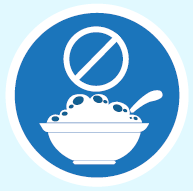DOES CROHN'S DISEASE AFFECT MENTAL HEALTH?
In Crohn's disease (CD), it's not just the affected physical health; mental health gets impacted too. The recurrent pain, unpredictable flare-ups, anxiety and worry that comes with CD can disrupt one’s emotional and mental wellbeing. Depression and stress can worsen the CD symptoms in turn.
Studies have found that people who have IBD are more likely to develop anxiety and depression than people who don't have IBD. Occasionally, people with CD who are in pain start to become predictive of the pain before it happens and stop doing things in expectation of the pain. They might stop eating or going out, and their lives get narrower, which may result in added anxiety or depression. Sleep problems are also common in people with CD, particularly during a flare-up.
It's essential to be aware of these risks. If a person has lost interest in doing things he/she used to love or is stressed with the everyday challenges of living with a long-term digestive disorder, it is essential to seek help from a doctor.
SYMPTOMS OF DEPRESSION AND ANXIETY
Symptoms of anxiety include:

Sleep problems

Lack of concentration

Fearfulness

Increase in heart rate

Sweating
Symptoms of depression include:

Feeling hopeless about life

Feeling empty or guilty

Being angry, teary, or sad all the time

Forgetfulness

No longer interested in social activities or sex

Feeling tired or listless

Little interest in eating

Feeling suicidal
TAKE A QUIZ
The K10 checklist is a simple measure of your psychological health. It uses a series of questions to rate certain aspects of your wellbeing, with results showing whether negative feelings, thoughts or emotions have affected your daily life.
This test should only take a few minutes to complete. It is important to be as truthful as you can. It is extremely common for anxiety and depression to co-exist with inflammatory disorders, but the good news is there are treatment and support options that can help.
Acknowledgement: “Professor Ronald C Kessler of the Department of Health Care Policy, Harvard Medical School is thanked for the use of research on the K10 funded by US Public Health Service Grants RO1 MH46376, R01 MH52861, RO1 MH49098, and K05 MH00507 and by the John D and Catherine T MacArthur Foundation Network on Successful Midlife Development (Gilbert Brim, Director).”
HOW TO COPE WELL WITH CROHN’S DISEASE?
These strategies may help one deal with the emotional toll of living with CD:

Remember that one is not alone
Many people around the world have CD

Be aware of the illness
Know the facts about the disease, possible complications, and information on managing flare-ups so that the situation can be controlled

Don't stop the treatment
Many people stop taking medicine when they do not have any symptoms or when the symptoms improve. This is where the risk of relapse or a flare-up may increase

Plan ahead
Keeping an emergency change of clothes, carrying a pack of wipes, and knowing the location of the bathrooms before reaching one’s destination or during travel may help

Keep the emotional turbulence at bay
Prepare for unexpected events even while hoping that they don’t happen. Stress-management techniques, like meditation or deep breathing, may help

Treat the depression
Treatment may help one handle depression symptoms. Along with the lifestyle changes and exercise, professional counselling and depression or anxiety medications may help one cope well with the disease

Maintain a diary
Take out some time to write down one’s thoughts. This can help a person recognize different emotional triggers that affect their disease symptoms
Stress management may help relieve the stress and make one feel better.
It is normal to feel stressed or sad when one has CD. Living with CD can make one feel negative.
One may benefit from some stress management techniques alongside their usual CD treatment.
Here are some tips:

Some emotion-focused strategies that may help include:





